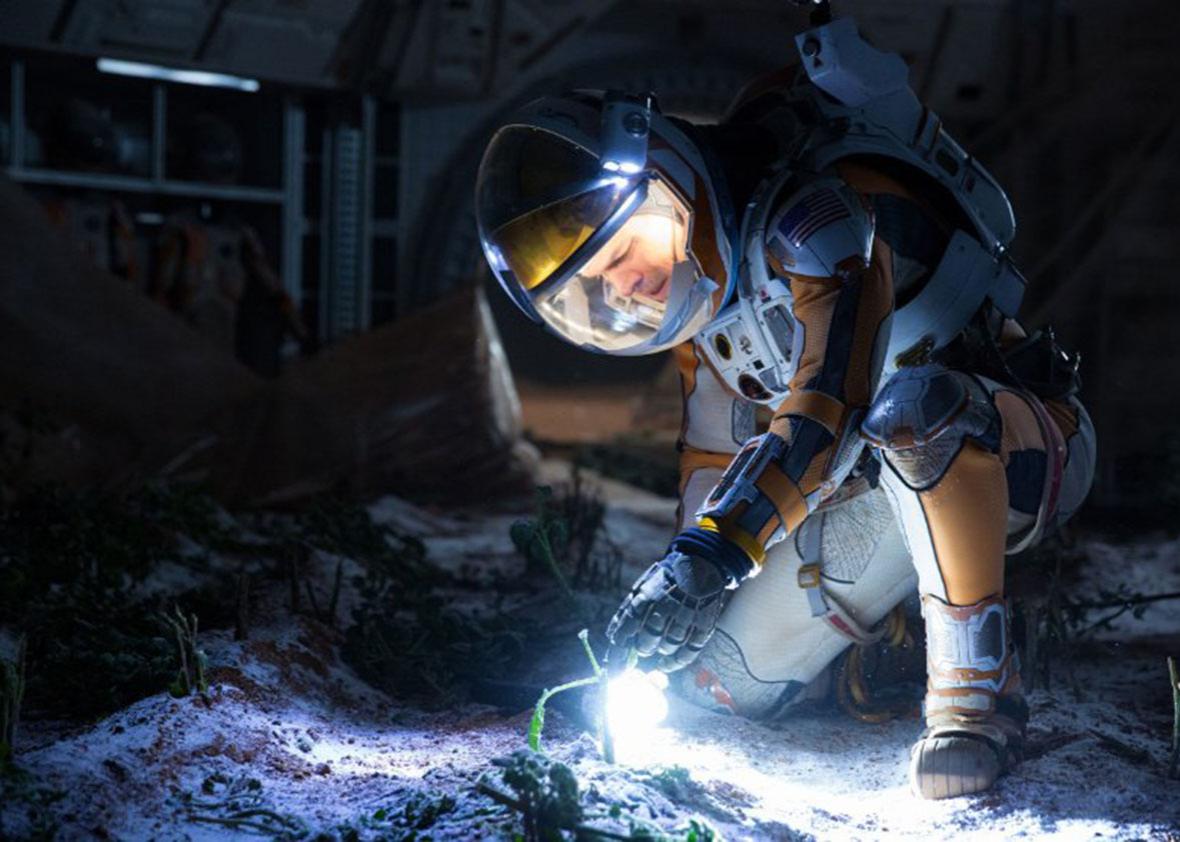The Martian, Ridley Scott’s spry, ABBA-fied take on Andy Weir’s hit novel, stars Matt Damon as Mark Watney, a botanist-astronaut whose jaunt on Mars goes south when he’s impaled by a radio antenna, thought dead by his crewmates, and left to solve a series of puzzle-problems to ensure his safe and timely rescue. The film’s rah-rah nerdery—brand-approved by arbiters like Neil deGrasse Tyson and the folks at XKCD—has charmed critics, who’ve dubbed it a “celebration of human intelligence” and a “brisk, funny piece of competence porn.”
That last description, “competence porn,” has been thrown around by many critics in describing The Martian. John Rogers, creator of erstwhile TNT drama Leverage, coined the term in 2009, when he and his writers realized that viewers were addicted to the show’s pipe-laying, jargon-laden briefing scenes. “Competence porn” is a truly excellent phrase for an old phenomenon; the frisson of watching smart people tackle tasks with freaky aptitude dates as far back as Robinson Crusoe. Liam Neeson, in movies like Taken and The Grey, is the James Deen of competence porn. Benedict Cumberbatch, in Sherlock, takes it to an antisocial extreme. You can even find it in places as unlikely as Man Vs. Wild, where Bear Grylls tailors a wetsuit from a seal carcass, or on MasterChef Jr., where preteens conjure pan-seared steaks and cauliflower couscous from a mystery box of ingredients. And then there’s Aaron Sorkin, the master of the genre himself, whose work is fueled by the romance of virtuosic human intellect and and smoothly functioning systems.
Part of the appeal of competence porn is the vicarious rush of watching someone deploy intelligence you admire yet can’t quite access. But the genre’s best moments lasso the audience into the work of problem-solving, too. Good competence porn—The West Wing, for example—illuminates, elevates, and even fetishizes the step-by-step process of achievement. Weir’s book, through its technical, clearly explicated storytelling, does this. And yet Scott’s movie emphatically doesn’t. It’s a film whose putative message is “worship the process and respect the details,” but whose actual narrative favors deus ex machina plot solutions over procedure. For all its emphasis on perseverance, The Martian turns mostly on “a-ha!” moments, quick jolts of resolution that preclude viewer engagement and conceive of struggle as a neat, uniform parceling of crises and remedies.
The Martian’s rendering of “process” has a basic template: Via his video log, Watney tells you the latest Big Problem, cracks wise, then tells you his latest Big Solution. We do, occasionally, see him baby-step his way through a crisis. But the movie is largely a chain of instant, MacGuyver-esque solutions summoned only to resolve whatever increasingly ridiculous hurdle he encounters. His rover doesn’t have enough power; cue the buried plutonium battery that he can jerry-rig in the backseat. Communication with Earth is impossibly tedious; cue NASA hacking a decades-old Pathfinder for text communication. Supplies won’t get to him on time; cue a new character, played by Donald Glover, who has a far-out idea about how to slingshot a spaceship back to Mars (the math checks out!). A NASA launch fails; cue China being able to lend a helping hand. None of this depicts the rough, piecemeal work of solving a problem; it depicts the sweet, instantaneous pleasure of a solution. It’s serendipity masquerading as scientific method. There’s nothing wrong with these pleasures in and of themselves, it’s just strange that the movie frames clever chance events as an All-American, strictly rationalist march toward triumph.
Every now and then The Martian lifts the hood and we get a glimpse of a movie that, like its source material, takes its “process” message seriously. Watney’s stab at Aresian agriculture maps the full arc of problem-solving—the obstacle, the idea, the trial-and-error-and-explosions of burning hydrogen for water, the rationing of the crops, the tang of success, the twist of fate when the potatoes freeze over. It’s the movie’s most moving sequence, because the competence on display is anchored both emotionally and intellectually by a process we witness firsthand.
The rest of the film is a showcase for “just tell me what happens next”-style storytelling. So this isn’t “competence porn”—it’s a movie whose point-of-view seems located about 15 minutes ahead of its plot, such that each setback comes off as a preemptively ennobled triumph-to-be. By the time we see Damon lift off in a tarp-covered chassis, pass out at the upper fringe of the Martian atmosphere, and puncture his suit so he can pinhole-thrust his way into the arms of a careening-through-space Jessica Chastain, it feels less like science than magic.
